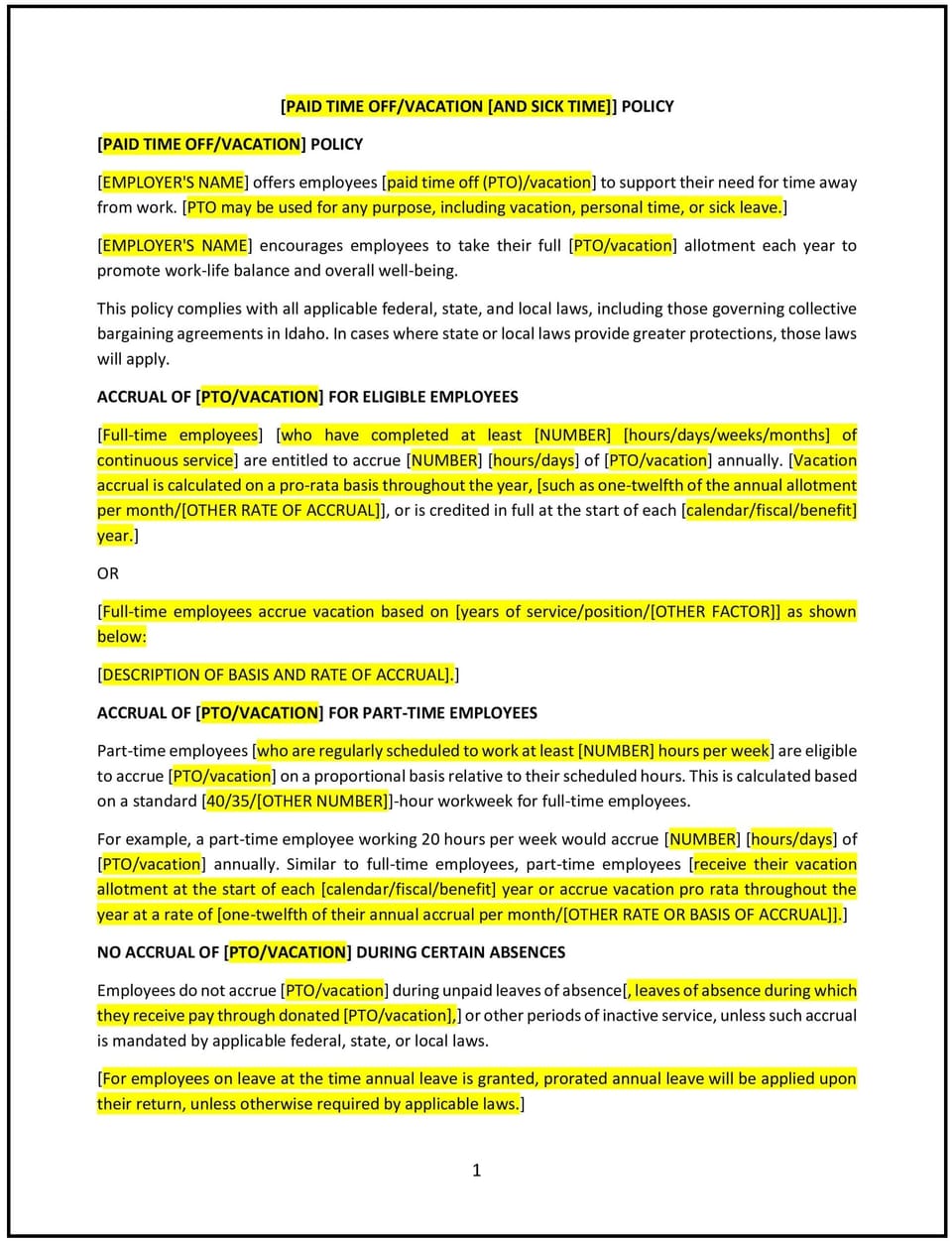Vacation policy (Idaho): Free template

Vacation policy (Idaho)
A vacation policy helps Idaho businesses establish guidelines for employees to request and use paid time off (PTO) for personal rest and relaxation. This policy outlines eligibility criteria, accrual rates, and the process for requesting and approving vacation time. It also emphasizes the importance of balancing employee well-being with business needs.
By implementing this policy, businesses can promote work-life balance, enhance employee satisfaction, and maintain productivity.
How to use this vacation policy (Idaho)
- Define eligibility: Specify which employees are eligible for vacation time, such as full-time or part-time workers, and any requirements, such as a minimum tenure.
- Outline accrual rates: Explain how vacation time is accrued, such as hours earned per pay period or days earned per year, and any caps on accrual.
- Set request procedures: Provide clear instructions for employees to request vacation time, including required notice, approval processes, and blackout periods.
- Address carryover and payout: Explain whether unused vacation time can be carried over to the next year or paid out upon termination, in accordance with Idaho laws.
- Communicate benefits continuation: Explain how benefits, such as health insurance, will be handled during vacation, including any employee contributions required.
- Train managers: Provide training for managers on how to handle vacation requests, maintain fairness, and ensure adequate staffing during employee absences.
- Review and update the policy: Periodically assess the policy’s effectiveness and make adjustments based on changes in business needs, employee feedback, or Idaho laws.
Benefits of using this vacation policy (Idaho)
This policy offers several advantages for Idaho businesses:
- Promotes work-life balance: Providing vacation time helps employees recharge, reducing burnout and improving overall well-being.
- Enhances employee satisfaction: A clear and fair vacation policy fosters loyalty and job satisfaction, leading to higher retention rates.
- Improves productivity: Employees who take regular vacations are more likely to return to work refreshed and productive.
- Attracts top talent: Offering competitive vacation benefits makes the business more appealing to skilled professionals.
- Reduces legal risks: Clear guidelines help businesses comply with Idaho laws regarding vacation time, minimizing the risk of disputes or penalties.
- Encourages a positive workplace culture: The policy reinforces the business’s commitment to supporting employee well-being and work-life balance.
Tips for using this vacation policy (Idaho)
- Communicate the policy clearly: Share the policy with employees during onboarding and through internal communication channels to ensure awareness and understanding.
- Train managers: Provide training for managers on how to handle vacation requests, maintain fairness, and ensure adequate staffing during employee absences.
- Monitor vacation usage: Keep track of vacation requests and usage to ensure consistency and fairness in applying the policy.
- Review legal updates: Stay informed about changes to Idaho laws regarding vacation time and update the policy as needed.
- Encourage transparency: Foster open communication with employees about their vacation options and the support available to them.
- Document everything: Maintain records of vacation requests, approvals, and any correspondence to ensure accountability and compliance.
Q: Why should Idaho businesses have a vacation policy?
A: A vacation policy provides clear guidelines for employees to request and use paid time off, promoting work-life balance and enhancing employee satisfaction.
Q: What types of employees should be eligible for vacation time?
A: Businesses should specify eligibility criteria, such as full-time or part-time status, and any requirements, such as a minimum tenure.
Q: How should businesses handle vacation accrual?
A: Businesses should outline how vacation time is accrued, such as hours earned per pay period or days earned per year, and any caps on accrual.
Q: What steps should employees take to request vacation time?
A: Employees should follow the request procedures outlined in the policy, including providing required notice and obtaining necessary approvals.
Q: Can unused vacation time be carried over or paid out?
A: Businesses should explain whether unused vacation time can be carried over to the next year or paid out upon termination, in accordance with Idaho laws.
Q: How can businesses ensure fairness in approving vacation requests?
A: Businesses should apply the policy consistently, provide clear communication, and document all requests and approvals to ensure fairness and transparency.
Q: How often should businesses review their vacation policy?
A: Businesses should review the policy annually or as needed to ensure it aligns with current business needs, employee feedback, or Idaho laws.
This article contains general legal information and does not contain legal advice. Cobrief is not a law firm or a substitute for an attorney or law firm. The law is complex and changes often. For legal advice, please ask a lawyer.


